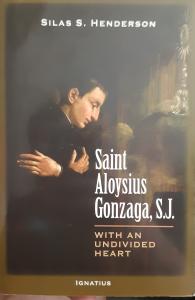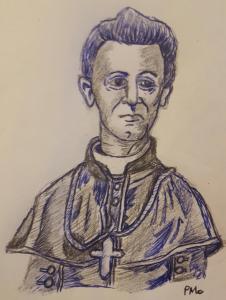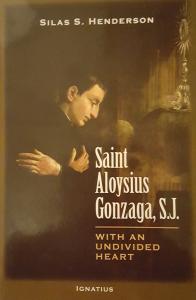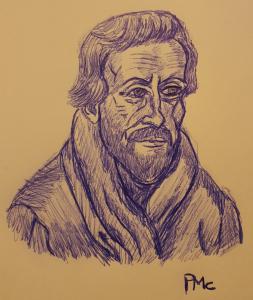![tumblr_mm1sqjqhAi1s9od7wo1_500[1]](https://wp-media.patheos.com/blogs/sites/224/2013/12/tumblr_mm1sqjqhAi1s9od7wo1_5001-252x300.jpg) FEAST OF THE IMMACULATE CONCEPTION.
FEAST OF THE IMMACULATE CONCEPTION.
“Thou art all, fair, my love, and there is not a spot in thee!”—Cant. 4.
As Christ, in a figurative manner, is compared to the sun, whose rise imparts strength, consolation, and growth to our spiritual life, so in the same figurative manner, do we behold in Mary the mother of Jesus, the rosy dawn which appeared before the day of salvation. This explains why we, as children of God, should also at the beginning of Advent, in a special manner, renew our devotion to Mary, the mother of God, and offer her our homage and our petitions.
The feast which the Church celebrates to day makes manifest to us how desirous the Church is that during the holy time of Advent we should earnestly, and with particular ardor, recommend ourselves to the protection and intercession of Mary.
The Church celebrates today the Feast of the Immaculate Conception of the Blessed Virgin Mary.
Making abstraction of the solemn declaration of Pope Pius IX, let us today reflect upon the reasons which prove to our mind, enlightened by faith, That Mary is the one, and the only one, among the children of men, who came into existence free from every stain of sin.
O, Mary, we pray Thee obtain for us the grace to live as thy children, free from sin.
I speak in the holy name of Jesus, to the greater honor of God!
Beloved in Christ: I have said that by my sermon of today in honor of the Blessed Virgin, I wish to remind you of the reasons which prove that Mary came into existence free from every stain of original sin. I wish to do it because this is one of those articles of faith which are so frequently misunderstood, attacked, and denied by the enemies of our holy religion.
What an advantage it would be if all the children of the Church were so thoroughly instructed, not only in this article of faith, but as regards all the doctrines of the Church, that they might be enabled to state definitely and correctly the articles of their faith, and show forth evidence that these articles are revealed truths, and have been held by the Church at all times!
The opponents of the Church misinterpret her teachings. The same may be said, alas, but too frequently, of Catholics themselves, who have not been thoroughly instructed in their religion, those who are mere nominal Catholics, and who live as such, clearly manifesting by their actions that they do not live of the root of faith.
In the case of non-Catholics, this apparent ignorance is often but a deliberate perversion of language. How important, therefore, is it that every well-instructed Catholic should clearly show the opponents of religion their ignorance and their willful malice, and prove to them that all their insinuations and accusations against the Church and its doctrines are utterly base, and really merit naught but contempt.
Thus, for instance, we are accused of adoring the saints and their images of purchasing indulgences in order to sin more freely, of adoring the Blessed Virgin and of placing greater confidence in her assistance than in that of Christ Himself.
The doctrine of Mary’s Immaculate Conception is especially misrepresented. Our enemies accuse us of believing that Mary was not born as other mortals, that she, like Christ, was conceived by the power of the Holy Ghost.
What pitiable and disgraceful ignorance or intentional malice which can invent such fables!
Go and say to such scoffers, “Friend, let me disabuse you of your error. Mary was a human being, St. Ann was her mother, and St. Joachim her father, but the omnipotence of God prevented her being deprived of sanctifying grace, and being born in disfavor of God in the state of original sin, a state in which all other children of Adam are born in consequence of the sin of our first parents.”
This privilege was a particular favor granted to her by God. This preference was due to her as the one chosen to be the mother of the Redeemer. The learned Duns Scotus has justly remarked: “God could effect this— it was proper that He should do so— hence He did so.” He preserved Mary free from the stain of original sin.
God could do it; He is omnipotent! It was proper that He should, for the sake of Christ, who was to be born of Mary.
Should Jesus, the heavenly Adam, have taken His flesh and blood from a soil that had once borne the curse of sin? This would not have been fitting. The body of the primitive Adam was taken from an unpolluted soil; therefore, it would not have been suitable that the body of Christ, the heavenly Adam, as the Apostle calls him, should be taken from a soil stained by sin. He who triumphed over death and hell could certainly not allow His mother to have been at any time under the control of Satan. The disgrace of the mother taints the honor of the son.
When we take into consideration the dignity of the Blessed Virgin, and her rank in the kingdom of God, we undoubtedly will acknowledge that it was but just she should be endowed with this purity. As mother of the Son of God made man, she was to be enthroned at the right hand of her divine Son as queen of heaven and earth.
The world was without blemish when it came forth from the hand of its Creator. The angels, both victorious and fallen, came into existence untarnished. Should she who was chosen to crush the serpent’s head, she who was to be the queen of angels, ever have been a slave of Satan?
This doctrine is confirmed by Sacred Scripture and the teachings of the holy Fathers. As regards Holy Scripture, the words of the Lord addressed to Satan in paradise already point to this prerogative: “She shall crush thy head.” This assurance was given him immediately after the fall of man, and with the first promise of redemption.
Had Mary been born in the state of original sin, then Satan would have crushed her head, and not she the head of Satan. This crushing points to a total destruction of the power of Satan!
Furthermore, the Sacred Scriptures speak of Mary, the future mother of the Redeemer, as the one chosen one, the stainless, all pure one, the lily among thorns, the sealed up fountain, the invincible tower.
The angel who declared unto Mary that she was to be the mother of God called her “Full of grace,” But she could not have been full of grace had she been devoid of the first and most precious of all graces: freedom from sin at the first moment of her existence.
The prerogative of the Blessed Virgin is also confirmed by tradition. The Apostle St. Andrew declares in his speech delivered in the presence of the pro-consul of Patras: “Just as Adam was formed of a soil on which the curse of sin had never rested, so also was the body of the heavenly Adam formed of a sinless virgin.” St. Ambrose calls Mary “free from every stain of sin.” St. Augustine says: “When sin is spoken of, let no mention be made of Mary, because of the honor of the Lord.”
In like manner do all the Fathers of the Church express themselves, and with St. Chrysostom, they call Mary purer than all the choirs of angels.
The devotion of the faithful in regard to this prerogative of the Blessed Virgin rose to such a degree that Pope Pius IX thought it opportune to proclaim this dogma an article of faith, in contradiction to the growing infidelity with which the world regards all revelation. He did so in the fullest conviction that the glory which would accrue to Mary by this declaration would at the same time increase and strengthen devotion to her in the hearts of all the faithful. Surrounded by two hundred bishops of the Catholic Church, he pronounced the Immaculate Conception of the Blessed Virgin Mary an article of faith.
Let us be thankful to God, therefore. Let us strive to be worthy children of such a mother, and by a pure and sinless life, give a pleasing and meritorious evidence of our joy at beholding Mary thus glorified. Amen!
Francis X. Weninger, S.J., Original, Short and Practical Sermons for Every Feast of the Ecclesiastical Year (Second Edition) (Cincinnati: C.J.H. Lowen, 1882), 1-6.
NOTE: Born in Austria, Francis Xavier Weninger (1805-1888) was one of the great Catholic preachers in 19th century America. He joined the Jesuits in 1832 and came to the United States in the 1840’s. Over the next forty years, he preached missions in every state in English, French and German. In one year, he was said to have preached over a thousand sermons; in another he preached 45 missions (a week-long event).











